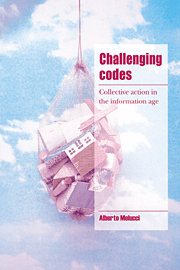Book contents
- Frontmatter
- Contents
- Preface and acknowledgements
- Introduction
- Part I Theory of collective action
- Part II Contemporary collective action
- 5 Conflicts of culture
- 6 Invention of the present
- 7 The time of difference
- 8 Roots for today and for tomorrow
- 9 A search for ethics
- 10 Information, power, domination
- Part III The field of collective action
- Part IV Acting collectively
- References
- Index
8 - Roots for today and for tomorrow
Published online by Cambridge University Press: 23 November 2009
- Frontmatter
- Contents
- Preface and acknowledgements
- Introduction
- Part I Theory of collective action
- Part II Contemporary collective action
- 5 Conflicts of culture
- 6 Invention of the present
- 7 The time of difference
- 8 Roots for today and for tomorrow
- 9 A search for ethics
- 10 Information, power, domination
- Part III The field of collective action
- Part IV Acting collectively
- References
- Index
Summary
Ethnic and cultural identity
The rise of ethno-nationalist movements, territorial and cultural struggles in contemporary societies has drawn much attention on the role of ethnic identity and cultural differences in conflicts. Involved here is a composite phenomenon in which elements belonging to centuries-old traditions interweave with others peculiar to postindustrial conflicts. Ethnicity, territory, and cultural traditions have asserted themselves as criteria by which identity is defined in complex societies. What are, then, the contents and meanings of these struggles? In what ways are they akin to other emergent movements?
An ethnic group is defined by a set of common biological-hereditary features and a shared historical-cultural tradition, by certain physical and racial traits, by a culture and specific forms of organization of social relationships, and by the self-affirmation of these commonalities. From this point of view, the problem of ethnic identity, especially in European societies, dates back at least to the time of the nation-state formation and to the processes of forced integration that these states set in motion. Such being the case, why has a problem as old as this, one which in certain cases has been an incessant generator of forms of resistance and struggle, now moved back to the centre stage of political and analytical interest?
- Type
- Chapter
- Information
- Challenging CodesCollective Action in the Information Age, pp. 145 - 162Publisher: Cambridge University PressPrint publication year: 1996



